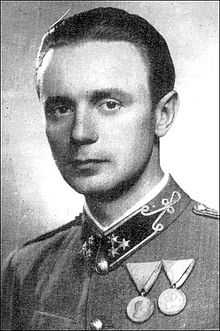Sándor Képíró
| Dr. iur. Sándor Képíró | |
|---|---|
|
Sándor Képíró in a gendarmerie uniform | |
| Born |
18 February 1914 Sarkad, Austria-Hungary |
| Died |
3 September 2011 (aged 97) Budapest, Hungary |
Resting place |
Sarkad, Hungary[1] 46°44′44.12″N 21°23′52.31″E / 46.7455889°N 21.3978639°E |
| Nationality | Hungarian |
| Occupation | Gendarmerie officer |
Criminal charge | Crimes committed against civilians during the Novi Sad Raid |
| Criminal status | Found not guilty |
| Awards | Hungarian Bravery Award |
Sándor Képíró (18 February 1914 – 3 September 2011)[2] was a gendarmerie captain during World War II accused of war crimes committed by Hungarian forces, and found not guilty.
In September 2006, Efraim Zuroff of the Wiesenthal Center made public copies of a 1944 court verdict finding Képíró and 14 other Hungarian Army and police officers of taking part in 1942 raid in Novi Sad. In 1948, the government of Hungary retried him in absentia and sentenced him to 14 years. This verdict was based upon the testimony of János Nagy, a former Hungarian soldier of Képíró's platoon. However, the testimony was given after the communist secret service tortured Nagy. Képíró claimed that he had never ever heard of him. Képíró returned to Budapest in 1996 without being identified until that point.[3]
Responding to the Wiesenthal Center accusations, Képíró said he had been a junior police officer at the time who had been involved in the round up of civilians, but denied taking an active part in the executions, which were carried out by soldiers. Képíró also said he refused orders to take part in anything illegal. "I was the only one who asked for a written command. At the time of the massacre I was reluctant. Prove that I was a war criminal." The 1944 verdict provided by the Wiesenthal Center, however, states that despite Képíró's request for written orders, he participated in the massacre even though none were given.
Hungarian military prosecutors state that the previous verdicts are no longer valid and a new investigation would have to be reopened, which might take years. On 14 September 2009, he was taken in for questioning by Hungarian police. However, because of the lack of evidence, the charges against him were later dropped.
Képíró has accused Efraim Zuroff of libel and initiated criminal proceedings in a Budapest court. The case opened in October 2010. If convicted, Zuroff could have faced up to two years in prison.[4][5] However, the case was dismissed on 17 December 2010 based on the 1944 verdict [6] as well as due to Képíró's failure to appear in court.[7]
On 14 February 2011 Hungarian prosecutors charged Képíró. On 18 July 2011, he was found not guilty by a Budapest court.[8]
After the verdict László Karsai, the leading Hungarian Holocaust historian, son of a Holocaust survivor, said: "Honestly, I wish Zuroff stopped doing what he's doing. I mean: with this kind of methods he uses, with so little evidence, he tries to drag people through the mire. This can't be done to anyone, can't be done even to a former gendarmerie officer either.” Professor Karsai accused Zuroff of being a hysterical, narcissistic Nazi-hunter, working only to earn a good living. Karsai claimed that the Wiesenthal Center made such a publicity to the case in order to justify its own existence before the sponsors.[9][10]
Sándor Képíró died in hospital in Budapest at the age of 97. His death was reported by his family and lawyer, who said he believed the trial in summer had contributed to his client's poor health.[11] Zuroff said on his Facebook page "our only consolation is that the trial has been negatively affected Képíró's health."[12]
Until 2011, he was on the Simon Wiesenthal Center's list of most wanted Nazi war criminals.
References
- ↑ "Hungarian Nazi war crimes suspect Sandor Kepiro buried". AsiaOne. 25 September 2011. Retrieved 27 July 2012.
- ↑ "Képíró Sándor - Életrajz (Biography)" (in Hungarian). National Legal Foundation. 17 May 2007. Retrieved 2010-10-14.
- ↑ http://worldnews.about.com/od/crime/tp/nazimostwanted.htm Most Wanted Nazis
- ↑ "Nazi hunter Zuroff on trial for libel". JTA. 13 October 2010. Retrieved 2010-10-14.
- ↑ Gil Shefler (10 October 2010). "Zuroff’s trial opens in Hungary". The Jerusalem Post. Retrieved 2010-10-14.
- ↑ http://www.bbc.co.uk/russian/international/2011/05/110505_hungary_nazi_trial.shtml
- ↑ Hungary: Court rejects libel suit against Efraim Zuroff
- ↑ Hungary Nazi war crimes suspect Sandor Kepiro acquitted
- ↑ Magyar Hírlap - Megbukott a nácivadász
- ↑ Index.hu - Felmentették Képíró Sándort
- ↑ Hungary Nazi war crimes suspect Sandor Kepiro dead
- ↑ MTI (2011-09-06). "Zuroff: kis győzelem Képíró halála". Fmh.hu. Retrieved 2011-10-09.
|
